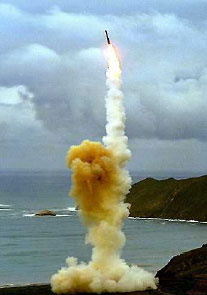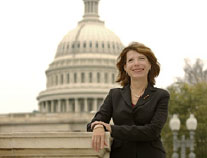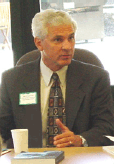 |
|
 |
 |
 |
 |
|
We have held firm to our belief that the most significant global threat of our time is the use of nuclear weapons. With terrorism remaining a constant threat to the U.S. and other nations, the need to secure and reduce nuclear material has become paramount, as has halting the proliferation of nuclear weapons, maintaining space as “weapons free,” and enacting barriers to the resumption of nuclear testing. As the current Administration continues to undermine international cooperation toward disarmament, a new arms race grows more possible.
This past year, we continued to fund the premiere national arms control organizations while engaging in lobbying activities to reduce the nuclear threat through our participation in and leadership of coalitions. Whether working to end Iran's and North Korea’s nuclear programs or attempting to stop the development of new nuclear weapons, our funding and advocacy efforts were always carried out in partnership with the most credible, respected individuals and groups working on these grave issues.
While we faced considerable political challenges to achieving our goals, side-by-side with our colleague organizations we have helped bring the issue of the nuclear weapons threat to the global stage.
Nuclear Nonproliferation Partnerships
Arms Control Advocacy Collaborative (AC2)
In 2002, with the Ploughshares Fund, we created the Arms Control Advocacy Collaborative (AC2), a lobbying initiative aimed at advancing a common nuclear nonproliferation and arms control agenda through the funding of a full-time, Washington, DC-based lobbyist and 10 participating nonprofit organizations. In December 2005, the Ploughshares Fund and Kirsch Foundation renewed AC2 for another three years, increasing the number of funded organizations to 14 and maintaining the same lobbyist, Terri S. Lodge, for a total financial commitment of more than $400,000 through 2008. AC2 member organizations and Terri have contributed technical, policy, grass roots, and legislative expertise while working toward a set of common goals.
During the last year, AC2’s advocacy agenda was varied, from preventing terrorism by locking up all nuclear bomb-making materials and reducing nuclear stockpiles; to limiting funding for new nuclear weapons; to preventing further deployment of a missile defense system; to promoting diplomacy in regions like Iran, India, and North Korea, where the danger of proliferation intensified.
AC2 played a critical role in creating barriers to funding the “bunker buster” weapon (also known as the Robust Nuclear Earth Penetrator) and expansion of a missile defense system, and was responsible for increasing bipartisan Congressional attention to the urgency of the nuclear threat. The collaborative sponsored briefings for colleague organizations and other partners on topics like the U.S.-India deal in order to share information and strategize on potential solutions.
All AC2 members, including Foundation staff, also participated in the Nuclear Weapons Working Group (NWWG), an informal alliance of organizations working to reduce the dangers posed by nuclear weapons by advocating for sensible Congressional legislation through expert and grassroots efforts. AC2, NWWG, and the Peace and Security Initiative (see below) all focused on similar and complementary priorities, with the goals of successful advocacy, increased communication among like-minded organizations, and public education about nuclear weapons issues.
|
|
The human race cannot coexist with nuclear weapons.”
• Iccho Itoh, Mayor, City of Nagasaki, Japan |
|
 |


Terri S. Lodge, Lobbyist for the Arms Control Advocacy Collaborative (AC2).
|
|
Peace And Security Initiative (PSI)
A group of foundations and nonprofits created the Peace and Security Initiative (PSI) in 2002 as a unique collaboration among advocacy groups, think tanks, grassroots organizations, and funders working to create “best practices” for the peace and security community while influencing U.S. policy to promote a more secure, peaceful, and just world. The Kirsch Foundation’s President & CEO played an integral role in PSI as a member of the Implementation Team, while other Foundation staff participated in community meetings and special briefings.
This year, PSI focused on building cooperative relationships within the arms control community and with Congressional staff in order to further a set of agreed-upon legislative priorities. Led by its first-ever Director, Deepti Choubey, PSI selected targeted grass roots and policy campaigns consistent with AC2’s and NWWG's priorities. Those initiatives included locking up nuclear material and reducing stockpiles in order to create barriers to terrorism; stopping new nuclear weapons development and testing; and promoting an end to the U.S. military’s involvement in Iraq while encouraging stability and reconstruction.
Through the annual Peace and Security Legislative Retreat and quarterly community meetings, PSI provided legislative, communications, and strategic planning information and training so that the community’s collective assets could be harnessed for the greatest impact. In collaboration with several foundations, the Kirsch Foundation co-sponsored a PSI Briefing for funders to learn about peace and security funding issues, featuring a panel of nonproliferation experts.
The Ploughshares Fund
In addition to collaborating with the Ploughshares Fund on AC2, we have annually made a substantial grant to the organization for its nuclear threats re-granting program. Called a “mutual fund for peace and security,” the Ploughshares Fund has substantial expertise about the individuals and organizations that are most effective worldwide in advancing disarmament and nonproliferation. Its Executive Director, Naila Bolus, is a leader in the community of organizations and foundations working to build international peace and security. Our funds have continued to be invested wisely by the Ploughshares Fund for the benefit of the field.
Peace and Security Funders Group
For years, we have participated as a member of the Peace and Security Funders Group (PSFG), an association of private and public foundations, operating foundations, charitable trusts, grantmaking programs, and individual philanthropists who make grants or expenditures that contribute to peace and global security. PSFG’s purpose is to enhance the effectiveness of philanthropic activity across this broad area of shared interests and commitments. The Kirsch Foundation’s President & CEO has served in various leadership roles within this funding collaborative to help further its mission and bring new donors to the field.
|
|

Deepti Choubey, former Director of the Peace and Security Initiative (PSI).

Joe Cirincione, formerly of the Carnegie Endowment for International Peace, speaks at the Foundation’s PSI Briefing.
|
|
 |
|
